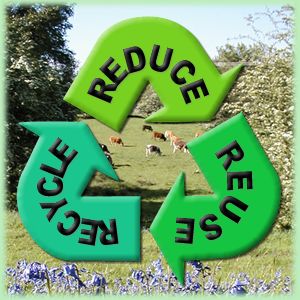è
Down-cycling and Up-cycling-
When a recycled good is cheaper or weaker than the original product, it's known as down-cycling (or downstream recycling). Eventually, goods move so far down the recycling stream it isn't feasible to recycle them any further. After being recycled a few times, paper is no longer usable. In some cases, goods can be up-cycled -- made into something more valuable than the original product.
Here are two more reasons to recycle-
When a recycled good is cheaper or weaker than the original product, it's known as down-cycling (or downstream recycling). Eventually, goods move so far down the recycling stream it isn't feasible to recycle them any further. After being recycled a few times, paper is no longer usable. In some cases, goods can be up-cycled -- made into something more valuable than the original product.
Here are two more reasons to recycle-
è Our “trash”, including scrap paper, metal and plastics, is one of the US’s largest current exports to China. They purchase our recyclable trash because they don’t have enough raw materials to meet their demand. In 2002, the US exported $1.2 billion worth of recyclables. In 2006, the export grew to $6.1 billion. (Excellent!)
è Recycling requires 90% less energy than making aluminum cans from ore or plastics from oil, plus it creates less waste and pollution.
è Trade in recyclates ( Wikipedia)
-> Computers being collected for recycling at a pick up event in Olympia, Washington, United States.
Certain countries trade in unprocessed recyclates. Some have complained that the ultimate fate of recyclates sold to another country is unknown and they may end up in landfills instead of reprocessed. According to one report, in America, 50-80% of computers destined for recycling are actually not recycled. There are reports of illegal-waste imports to China being dismantled and recycled solely for monetary gain, without consideration for workers' health or environmental damage. Though the Chinese government has banned these practices, it has not been able to eradicate them. In 2008, the prices of recyclable waste plummeted before rebounding in 2009. Cardboard averaged about £53/tonne from 2004–2008, dropped to £19/tonne, and then went up to £59/tonne in May 2009. PET plastic averaged about £156/tonne, dropped to £75/tonne and then moved up to £195/tonne in May 2009. Certain regions have difficulty using or exporting as much of a material as they recycle. This problem is most prevalent with glass: both Britain and the U.S. import large quantities of wine bottled in green glass. Though much of this glass is sent to be recycled, outside the American Midwest there is not enough wine production to use all of the reprocessed material. The extra must be downcycled into building materials or re-inserted into the regular waste stream.
Similarly, the northwestern United States has difficulty finding markets for recycled newspaper, given the large number of pulp mills in the region as well as the proximity to Asian markets. In other areas of the U.S., however, demand for used newsprint has seen wide fluctuation.
In some U.S. states, a program called Recycle Bank pays people with coupons to recycle, receiving money from local municipalities for the reduction in landfill space which must be purchased. It uses a single stream process in which all material is automatically sorted.



No comments:
Post a Comment